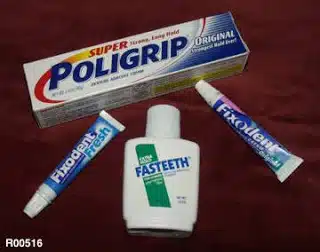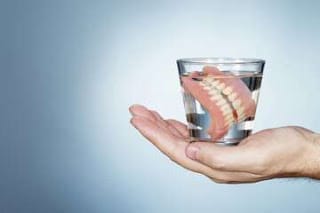Getting used to dentures might seem daunting initially, but after a bit of practice, with and caring for the dentures will look like second nature. Whether you utilize adhesives to maintain your upper, lower, or both sets of dentures set up is a personal option. Should you use denture adhesives/denture glue, learning how to remove your dentures is among those denture-wearing skills you will quickly master with only a small practice. Within a week you are going to be an experienced expert.
When the denture adhesive is insoluble in water, then how do the denture be eliminated?
Denture adhesives include 2 Chief elements:
The Polyvinylacetate is your dental glue. It functions only on a sterile surface. To maintain the jaw dry, we utilize Carboxymethylcellulose (CMC). CMC functions just like a sponge–it absorbs spit. If the sponge” is stuffed” with spit and no longer saliva can be consumed, the jaw gets moist, the Polyvinylacetate loses contact with the chin along with the denture remains in position just by suction.
The user can eliminate the dentures. Each of the residues of this adhesive will stay on the dentures. No denture glue is left to the gum. The residues of this adhesive can readily be eliminated by using cleansing pills.
Directions
 |
| Various brand of denture adhesive |
- For your top denture, removal might be more difficult because of more surface area. Twist your fingers or thumbs, whatever is more comfortable, between the top dentures as well as your cheek on each side.
- Press down softly on the top section of the dentures, in which they fulfill your teeth until the adhesive seal is loosened and the dentures come from your mouth easily. Attempt to push down with pressure, even though you are able to apply slightly more pressure to one side, then another, if needed, to loosen the dentures.
- Grip the dentures between your thumb and forefingers on both sides, then pull them out as you gently rock the dentures from side to side to loosen them. It is possible to anticipate the lower dentures to generally come out more readily than the top.
- Moisten a washcloth with warm water. Rub the fabric over your gums to get rid of stuck-on denture glue. Wet your toothbrush, put in a pea-size quantity of toothpaste and brush your teeth to wash off staying denture glue. It’s necessary to wash and brush your teeth daily to maintain great dental wellness.
If you don’t have success using these methods and are uneasy leaving your dentures overnight, you can search for help at a hospital emergency room or even a 24-hour dental support.
CAUTION: To prevent injury, don’t use any item except the fingers (not your fingernails) to pry the dentures loose.
Can the denture be eliminated until the saturation point is reached?
Usually, there would not be a requirement to remove the denture because no food particles become trapped under. But specific cases such as injuries the dentures could be taken out with just a tiny force. It’ll be a painless process and will cause no negative consequences, but residues may be left over the gum. These residues aren’t dangerous and will come off by themselves after a couple of hours.
Under no conditions should denture cleaner or other removal procedures be utilized to wash out the gum.
The Way to Eliminate Adhesives from Dentures
REMOVERS – You will find specialist removers which you are able to buy. The majority of them are extremely similar and operate nicely. Read the instructions carefully and make use of the denture adhesive removers precisely the manner in which the manufacturer suggests.
HOT-WATER -Hot items typically loosen up dentures. Use hot water to loosen the paste up in your dentures. Fill out a little cup with warm water, and swish the water around in your mouth. This tacky paste-like material will warm up and come off easily. In case the adhesive is in your mouth, then you might not wish to use this removal procedure.
Should you use hot water in your mouth to remove the denture glue to make certain the water isn’t too hot it will burn you. This is a good method to eliminate adhesives out of your dentures as soon as they are out from your mouth.
COLD-WATER – Cold water can be an easier way to take out the adhesive from your mouth or dentures. Take cold water ice cubes and place them in your mouth. This may freeze the denture glue and permit you to remove it readily.
FEWER ADHESIVES – you might also begin using less adhesive if this really is becoming an issue for you. Many people today realize that changing the sort of adhesive can also be valuable. Consider using a powdered adhesive in a really small quantity so that surplus adhesive doesn’t become stuck in the interior of the mouth. This is the very best way to avoid needing to remove adhesives out of the dentures.
RELATED READING:
Credit Source
- http://www.intelligentdental.com/2011/10/17/how-to-remove-dentures-that-have-been-fixed-in-with-denture-adhesive/








